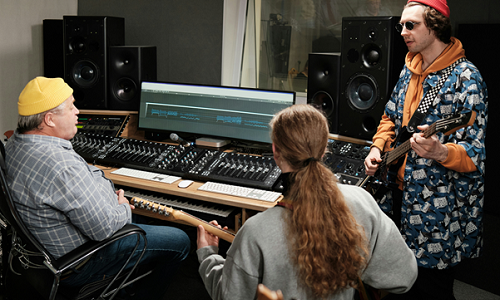Marshall Chasin, AuD writes, In my practice, I often encounter hard-of-hearing musicians from various backgrounds such as rock, jazz, or pop, who struggle with staying on key. Similarly, hard-of-hearing audio engineers sometimes find it challenging to manage sound equalization, whether during live performances or studio sessions. Here are two practical tips that can enhance their music monitoring skills and potentially extend their careers.
Tip 1: Get Closer to the Bass Player
Certain music genres, like Celtic and Hindustani Vedic, use a drone—a continuous bass note—that helps musicians identify the musical key. This drone makes it easier for hard-of-hearing musicians to discern the key and play the correct notes and chords harmoniously.
In genres without a clear drone, such as Western rock, pop, and jazz, the bass player becomes crucial. The bassist ensures the music remains harmonically coherent, much like a drone but with variations as the music progresses. Hard-of-hearing musicians can benefit from increasing their focus on the bass line, either through in-ear monitors or by physically moving closer to the bass player, to better follow the musical keys.
Tip 2: Mix Music at Higher Sound Levels
Hard-of-hearing audio engineers often face the challenge of mixes being perceived as too bright (too much high-frequency boost) or too dull (insufficient high-frequency boost). Unlike hearing aids, standard audio equipment does not adjust equalisations based on sound levels, which can make consistent mixing challenging.
One effective strategy is to mix or adjust equalisations at higher sound levels, around 80 or 85 dB SPL. This leverages the natural compensation of a damaged cochlea at higher volumes, potentially providing a more balanced mix. Brief exposure to these higher levels can be safe and should allow for accurate adjustments in a matter of minutes.
These strategies not only help hard-of-hearing professionals maintain quality in their work but also encourage a collaborative and adaptive approach in the music industry. So, make sure to team up with your bass player and don’t hesitate to mix at those higher levels for the best sound quality.
From Two Tricks for Hard-of-Hearing Musicians and Audio Engineers, https://hearingreview.com/hearing-loss/hearing-loss-prevention/music-entertainment/two-tricks-for-hard-of-hearing-musicians-and-audio-engineers?

